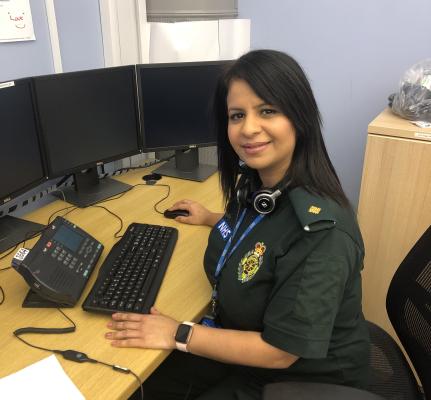Occupational health nurse
Occupational health nurses advise working people and organisations of the impact of work on health and wellbeing.
You’ll protect, promote and enhance the health and wellbeing of people in work.
You’ll advise employers on the importance of creating workplaces that are safe, productive and inclusive. You’ll also lead services to help prevent work-related ill health.
Life as an occupational health nurse
Your working life as an occupational health nurse will depend on the sector and organisation as each will have different employees with different health needs, risks to health, environments and cultures. Your work may be at an organisation level and with individuals.
Your role might involve:
- health needs assessments
- provision of training and information
- health promotion and wellbeing advice and campaigns
- supporting risk management and reduction relating to health. For example:
- monitoring the effectiveness of risk controls through health surveillance
- advising on work related immunisations
- advising on work related stress and mental health.
- helping to identify and prevent work-related ill health, for example:
- protection of people’s hearing
- respiratory protection programmes
- assessing the impact of work or tasks on people’s health
- giving immunisations and taking blood samples
- advising on management of health emergencies and first aid management
- undertaking health surveillance such as lung function testing, audiometry testing, depending on the hazards within a role.
You’ll work on your own or as part of an occupational health team in one or more industries such as:
- public sector
- health and social care
- construction
- manufacturing
- retail
- banking
- rail
- academia.
You’ll work closely with employers and their employees, line managers, human resources (HR) staff, health and safety advisors and a wide range of other healthcare professionals.
Rita Bains
Occupational health adviser
Read Rita's storyKnowing that I’m helping people find solutions to health-related issues that impact their daily lives gives me great satisfaction.

How much can I earn?
If you are employed in the NHS you will usually work at Agenda for Change band 5 or 6, with most qualified occupational health nurses moving into band 7.
How about the benefits?
- make a difference
- flexible and part-time working
- excellent pension scheme
- good holiday entitlement
- NHS discounts in shops and restaurants
Must have skills
- customer service, patient-centred care
- interviewing
- critical thinking
- listening and communication
- teaching and advising
- problem solving
- health promotion and behaviour change skills
Entry requirements
You will need to be a registered adult, child, learning disability, or mental health nurse or registered midwife to apply for occupational health nursing posts.
Applying for a job within a large occupational health service or a training post should help you gain adequate supervision and support. This is especially important for a first job in occupational health.
How to become an occupational health nurse
You can go straight into an occupational health nurse role after registration with the Nursing and Midwifery Council (NMC). There’s also the opportunity to obtain additional qualifications in occupational health:
- a foundation course such as the FOM Diploma in Occupational Health Practice and or
- a Higher Education postgraduate diploma, BSc in Occupational Health Practice and/or
- postgraduate diploma, BSc or MSc Specialist Community Public Health Nurse (SCPHN) – OH course.
The new SCPHN standards for post registration and education can be found on the NMC website.
Where a career as an occupational health nurse can take you
The Faculty of Occupational Health Nursing (FOHN) have a useful guide to careers in OH nursing.
Want to learn more?
Want to come back?
If your SCPHN registration has lapsed then you may need to complete a return to practice programme. Email us so that we can put you in touch with someone in your local area who can offer tailored advice.
Can't find a job in your area? Visit NHS Jobs for more vacancies.
-
Occupational Health Nurse
Preston, Salford, PR2 9HT
- Salary :
- £31049.00 to £37796.00
- Type :
- Fixed-Term
- Employer :
- Wrightington Wigan & Leigh Teaching Hospitals NHS Foundation Trust
-
Occupational Health Nurse
Blackburn, BB2 3HH
- Salary :
- £29970.00 to £36483.00
- Type :
- Fixed-Term
- Employer :
- East Lancashire Hospitals NHS Trust
-
Occupational Health Adviser
Chelmsford, CM1 7ET
- Salary :
- £38682.00
- Type :
- Permanent
- Employer :
- Mid and South Essex NHS Foundation Trust
-
Head of Occupational Health
Guernsey, GY4 6UU
- Salary :
- £70723.00 to £84752.00
- Type :
- Permanent
- Employer :
- States of Guernsey
-
Specialist Occupational Health Nurse Advisor
Maidstone, ME16 9QQ
- Salary :
- £47810.00 to £54710.00
- Type :
- Permanent
- Employer :
- Maidstone and Tunbridge Wells NHS Trust
-
Specialist Occupational Health Nurse Advisor
Maidstone, ME16 9QQ
- Salary :
- £47810.00 to £54710.00
- Type :
- Permanent
- Employer :
- Maidstone and Tunbridge Wells NHS Trust
-
Occupational Health Specialist Mental Wellbeing Nurse
Worcester, WR5 1DD
- Salary :
- £37338.00 to £44962.00
- Type :
- Permanent
- Employer :
- Worcestershire Acute Hospitals NHS Trust
-
Occupational Health Senior Nurse Lead (NHS Lead)
Gloucester, GL1 1LY
- Salary :
- £55690.00 to £62682.00
- Type :
- Permanent
- Employer :
- Gloucestershire Health and Care NHS Foundation Trust
-
Band 8b - Head of Occupational Health, Human Resources
Watford, WD18 0HB
- Salary :
- £66653.00 to £77094.00
- Type :
- Permanent
- Employer :
- West Hertfordshire Teaching Hospitals NHS Trust
Showing 6 of 9 results
-
- Royal College of Nursing
- Nursing and Midwifery Council
- Faculty of Occupational Health Nursing
- iOH
- Society of Occupational Medicine with some case studies to help you understand more about the role and the routes in
- The National School of Occupational Health (NSOH)




